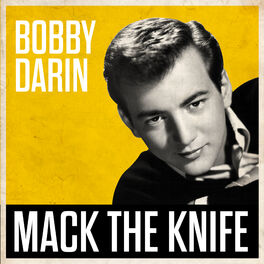 | Mack the KnifeLouis Armstrong |
Writer(s): Kurt Weill (m)/Mark Blitzstein (l)/Berthold Brecht (l) (see lyrics here) First Charted: January 13, 1956 Peak: 20 US, 77 HR, 8 UK, 14 AU, 18 DF (Click for codes to charts.) Sales (in millions): -- Airplay/Streaming (in millions): -- radio, 5.03 video, -- streaming |
 | Mack the KnifeBobby Darin |
First Charted: August 24, 1959 Peak: 19 US, 18 CB, 2 GR, 15 HR, 6 RB, 12 UK, 12 CN, 1 DF (Click for codes to charts.) Sales (in millions): 1.0 US, -- UK, 2.0 world (includes US + UK) Airplay/Streaming (in millions): -- radio, 24.03 video, 44.7 streaming |
 | Mack the KnifeElla Fitzgerald |
First Charted: April 21, 1960 Peak: 27 US, 31 CB, 6 RB, 19 UK (Click for codes to charts.) Sales (in millions): -- Airplay/Streaming (in millions): -- radio, 2.13 video, -- streaming |
About the Song:“Mack the Knife” originated in 1928 as “Moritat,” which translates to “murder deed.” RCG Bertlot Brecht and Kurt Weill wrote the original German song about “a bloodthirsty Berlin gangster” RS500 on the prowl. It was written for the musical The Three Penny Opera, which was based on The Beggar’s Opera, written by John Gay in the 18th century. It was the first opera written in English. TB Despite the song’s gruesome subject matter, the irresistible melody made the song hit-worthy. KL Instead of translating the lyrics literally, Marc Blitzstein was assigned to give the song a rewrite. SJ The song became a standard before Bobby Darin ever recorded it. “Mack” charted six times in 1956 alone; the Dick Hyman Trio’s #8 instrumental version being the most successful. However, Darin’s version trumped them all. A year earlier, at age twenty-two, Darin first hit with the “Splish Splash,” followed by three more hits which cemented his appeal to the teen market. However, he wanted the kind of longevity enjoyed by Frank Sinatra. At the time Darin even told Billboard, “In night clubs I learn to other things. I even do ‘Mack the Knife.’” BB Bob Dylan said Darin would have, like any other kids growing in the ‘40s and ‘50s in America, wanted to be Sinatra – “the way he dressed, the way he sang, the way the girls flocked to his side and swooned.” BD Thankfully, Tom Dowd, an engineer and producer at Darin’s label, Atlantic Records, was “always on the look-out for new and innovative artists who could preserve the blues or jazz tradition, but the company was concerned that songs should be timely and would cater to the root of the artist, and at the same time would be merchandisable.” TC Ahmet Ertegun, the co-president of the record company, was interested in taking Darin “out of the pop world and into a more adult sphere.” TC Darin recorded “Mack the Knife” for his standards album That’s All. He never saw it being a single SJ but Atlantic thought otherwise. Darin got booked to perform on American Bandstand. The producer said, “if he wants to turn his career into chopped liver, so be it.” TB It may be the smartest career move Darin ever made. TB It transformed his image into that of “a finger-snapping sophisticate at home in the cocktail lounge.” RS500 It also gave the label its first non-R&B pop hit. TC Resources:
Related Links:First posted 8/24/2011; last updated 4/2/2023. |








No comments:
Post a Comment